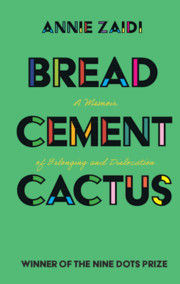Acknowledgements
This book draws upon memory, my own but also those of my family members, so I must begin by thanking the family for the stories I’ve been told, and for maintaining the physical sites that offer a sense of place in our various ancestral homes.
I owe my mother, Yasmin Zaidi, all kinds of thanks for the wonderful, intricate work she has done on the illustrations accompanying this book. And for everything else, including building that home within the ancestral home, and her stubborn faith that it matters.
Several conversations with friends, acquaintances and strangers helped me think through my ideas about home and homeland. For conversation, hospitality, book recommendations, caffeine, sweets and savouries, I must thank Kavita Srivastav, Rajeev Yadav, Rima Hooja, Alok Rai, Abhishek and Mamta Pandey, Ramesh Dixit, Naseeruddin Sanjari, Lenin Maududi (a pseudonym), Ali Khan Mahmudabad, Riaz Tehsin, and for clarifying some questions of law, Gautam Bhatia. I am grateful to Om Thanvi, Apurva Narain, Fatima Rizvi, Rahul Soni, Saeed Naqvi, for helping me chase an elusive reference.
I owe a debt of gratitude to Salman Khan and his father, Zishan Khan, for helping with the transcription of my grandfather’s literary memoir.
I owe another debt to Saka Ram Garāsia, for his guidance and time, without which I could not have managed a significant part of my research in such a short period of time. I recall with affection the schoolteachers in Sirohi and former schoolmates who met me with kindness and warmth upon my return.
It has been a pleasure working with my editor Chris Harrison, and the wonderful team at Cambridge University Press and Riot.
I was immensely lucky in winning the Nine Dots Prize, and am grateful for the support I’ve received from the Kadas Prize Foundation. Professor Simon Goldhill and Professor David Runciman were kind enough to read an early draft and gave valuable feedback. Double thanks are due to Jane Tinkler, for various conversations during the course of making this book, but especially for helping me access a document that was impossible to find in India.
I am also grateful for my time at the Centre for Research in the Arts, Social Sciences and Humanities, Cambridge University, for giving me an opportunity to read, access some wonderful libraries and attend intellectually stimulating seminars that helped me connect some of the dots and make sense of this fragile thing called home.



